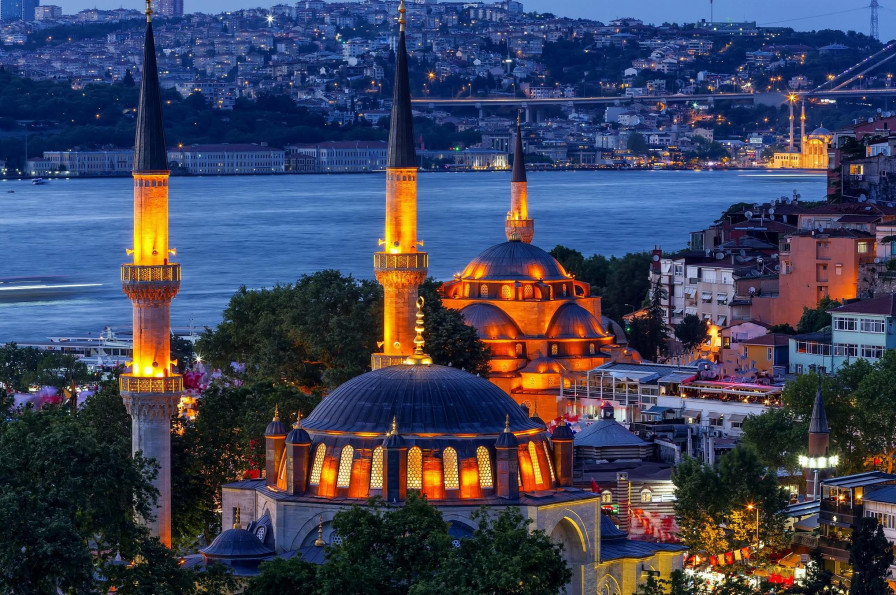What is the infrastructure in Istanbul?

Introduction
Istanbul is the largest city in Turkey, located on the border of Europe and Asia. Its geographical position plays an important role in the development of its infrastructure. The historical context has also had a significant impact on the development of infrastructure in Istanbul.
Geographic location of Istanbul
Istanbul is located on the Bosphorus, the strait that separates Europe and Asia. This is a strategically important place, which has great economic and geopolitical significance. Due to its unique position, the city has become a key transport hub between the two continents. This has led to the need to develop a strong and efficient infrastructure to ensure the smooth flow of people and goods.
Historical Context of Infrastructure Development
Istanbul has a rich history stretching back thousands of years. For many centuries the city was the capital of various empires, including the Byzantine and Ottoman ones. This left its mark on the development of infrastructure in the city. Many historical sites such as the Blue Mosque and the Grand Bazaar have become important tourist attractions, attracting millions of visitors every year. In this regard, the infrastructure, including the transport system and the hotel industry, has been developed and improved to meet the needs of tourists.
Infrastructure in Istanbul
Modern Istanbul has a developed infrastructure, which includes a wide network of roads, bridges and tunnels, as well as public transport, including metro, buses and ferries. This allows residents and visitors to the city to easily move around the city. In addition, Istanbul has many modern shopping malls, restaurants and hotels providing a comfortable stay for tourists.
In general, the geographical location and historical context of Istanbul played an important role in the development of its infrastructure. Today, the city has a modern and efficient infrastructure that provides comfortable living and transportation for its residents and visitors.
Transport infrastructure
Istanbul, which is the largest city in Turkey, has a developed and modern transport infrastructure. The capital of Turkey has many transport facilities that provide convenience and comfort for residents and guests of the city.
Istanbul International Airport
One of the key elements of Istanbul's transport infrastructure is the Istanbul International Airport. This airport, opened in 2018, is one of the most modern and largest airports in the world. It serves a huge number of passengers and offers a wide range of airlines connecting Istanbul with various cities and countries.
Metropolitan and tram network
Istanbul is also famous for its well-developed public transport system, which includes the metro and tram network. Istanbul Metro is one of the most popular and convenient ways to get around the city. It covers many stations and lines, linking various areas of Istanbul. Trams also provide a convenient way to get around, especially in the historic part of the city.
Bridges and tunnels across the Bosphorus
The Bosphorus, the strait that separates Europe and Asia, is one of Istanbul's main attractions. To ensure ease of movement across the Bosporus, bridges and tunnels were built in the city. One of the most famous bridges is the Juškudar-Bosporus Bridge, which connects two continents and provides a beautiful view of the city. Also worth noting is the Marmara Tunnel, which is the first underwater railway tunnel in Turkey and facilitates transport links between the two continents.
In general, the transport infrastructure of Istanbul offers many opportunities for convenient and fast movement around the city. Thanks to the developed airport, metro, tram network, bridges and tunnels, residents and visitors of Istanbul can easily and comfortably reach their destinations.
Housing infrastructure
Istanbul, one of the largest cities in Turkey, offers its residents a variety of opportunities for comfortable living. The development of residential complexes is one of the priorities of the city administration, which makes it possible to provide the population with high-quality and modern housing.
Istanbul has a wide network of educational and medical institutions, which makes it attractive for families with children and people who value their health. The city is home to both public and private schools, colleges and universities offering high quality education. In addition, Istanbul is famous for its modern medical centers, where you can get qualified medical care.
Shopping and entertainment centers in Istanbul offer a wide range of goods and services for residents and visitors of the city. The city has numerous shopping centers where you can buy everything you need - from food to fashionable clothes and electronics. In addition, Istanbul offers a rich cultural and entertainment program - here you can visit museums, theaters, cinemas, as well as try national cuisine in numerous restaurants and cafes.
In general, the housing infrastructure in Istanbul is developed at a high level, which makes the city attractive for living. The development of residential complexes, the presence of educational and medical institutions, as well as the presence of shopping and entertainment centers allow residents of the city to enjoy the comfort and convenience of modern life.
Communal infrastructure
Istanbul, one of the largest cities in Turkey, is famous for its developed public infrastructure. In this article, we will look at three main aspects of public infrastructure in Istanbul: energy infrastructure, water supply and sewerage, and waste management.
Energy infrastructure
Istanbul has an extensive energy infrastructure that provides the city with a reliable energy supply. Powerful power plants operate here, providing electricity for residential buildings, businesses and offices. In addition, the city has heating systems that provide heating in winter. All this allows residents and businesses of Istanbul to comfortably exist and work in a stable energy supply.
Water supply and sewerage
Istanbul is also proud of its water supply and sewerage system, which provides the city's residents with clean drinking water and an efficient wastewater collection and treatment system. The city has a water supply network that delivers water from sources and reservoirs to every home and business. Istanbul's sewer system is equipped with modern sewage treatment plants that treat wastewater before it is discharged into the sea. This keeps water resources clean and maintains the city's environmental sustainability.
Recycling
The problem of waste disposal is relevant for many large cities, but Istanbul successfully copes with this task. The city has modern waste incineration plants and landfills for the treatment and disposal of waste. This minimizes the impact of waste on the environment and reduces the risk of pollution. In addition, Istanbul actively pursues programs for the separate collection of waste and its processing, which contributes to the sustainable development of the city and the conservation of natural resources.
In general, the communal infrastructure of Istanbul is one of the best in the region. The city actively invests in the development and improvement of energy, water supply and waste management systems, which contribute to comfortable living and environmental sustainability of citizens.
Tourism infrastructure
Istanbul is one of the most popular tourist destinations in the world, and its infrastructure is fully consistent with this status. The city offers a wide range of hotels and inns, restaurants and cafes, as well as many attractions and museums.
Hotels and Inns
In Istanbul, you can find hotels and inns for every taste and budget. From luxurious five-star hotels overlooking the Bosphorus to cozy family guest houses in the historic part of the city, the choice is huge. Most hotels offer comfortable rooms with modern amenities, as well as various services such as spas, swimming pools, restaurants and bars.
Restaurants and cafes
Istanbul is famous for its rich culinary culture, and the city's restaurants and cafes offer a variety of options for all tastes. Here you can taste authentic Turkish dishes such as dolma (stuffed vegetables), kebabs and baklava, as well as enjoy dishes from different cuisines of the world. Many restaurants are located on the rooftops of the buildings, offering stunning views of the city and the Bosphorus.
Attractions and museums
Istanbul is a city with a rich history and many sights and museums can be found here. One of the most famous is Hagia Sophia, a former Orthodox cathedral church converted into a mosque and then a museum. Other popular sites include Topkapi, the former residence of the Ottoman sultans, and the Blue Mosque, famous for its ceramic tiles. In addition, the city has many museums dedicated to history, art and culture.
In general, the tourist infrastructure in Istanbul offers everything you need for a comfortable and interesting holiday. From hotels and inns to restaurants and museums, the city will satisfy even the most demanding travelers.
Conclusion
In conclusion, we can say that the infrastructure in Istanbul is one of the most developed and modern in the world. The city has a wide network of roads, bridges, tunnels and subways, which ensures convenient and fast movement around the city.
In addition, Istanbul has a huge number of different infrastructure facilities, such as airports, ports, railway stations and bus stations. This makes the city attractive for tourists and businessmen who can easily and comfortably reach their destination.
An important element of the infrastructure of Istanbul are also its medical institutions, educational and scientific centers, shopping centers and entertainment complexes. This allows residents and guests of the city to receive high-quality medical services, education and entertainment at the highest level.
Thanks to its developed infrastructure, Istanbul attracts many investors and is an attractive market for various business sectors. The city offers favorable conditions for offices, manufacturing plants and warehouses.
In general, the infrastructure in Istanbul plays a key role in the development of the city and provides its residents and visitors with comfortable living and working conditions. Thanks to constant investment in infrastructure development, Istanbul continues to grow and attract more and more people from all over the world.























